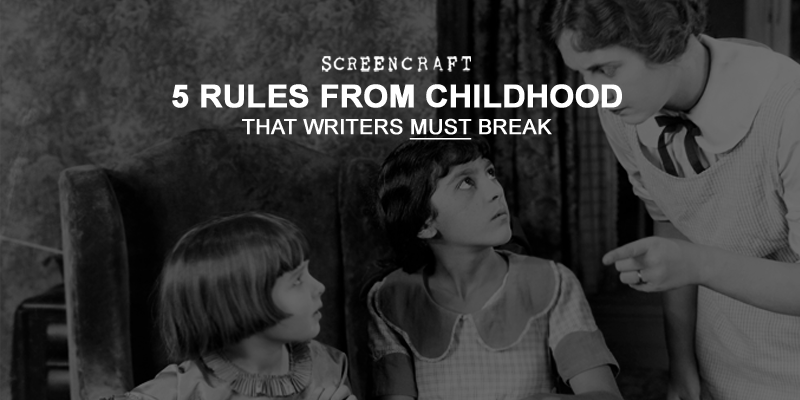5 Rules From Childhood That Writers Must Break

We all remember those seemingly endless rules that we grew up with through the years. And those of us that have children now — or will in the future —are likely passing those "laws of the land" down with each and every generation.
Don't chew with your mouth open. Don't swallow your gum. Don't use your outside voices in the house. Don't slam the doors. Don't put your G.I. Joes directly on the light bulb of a lamp — okay, that last one was probably just reserved for my 10-year-old self. RIP Zartan.
The list goes on and on.
Yet as we grow older and wiser, we learn many of the rules are meant to be broken as we come of age and enter the real world. Below we explore five of those parental and authoritative commandments and showcase why screenwriters — and all writers alike — NEED to finally break these rules — and break them with gusto.
1. Don't Color Outside of the Lines
Whether it was our teachers or parents, we all remember this immortal rule that was constantly thrown down upon us during coloring sessions. But as writers, this is a rule that needs to be broken if you want to have any hope of success.

The problem is that pundits and gurus are constantly telling screenwriters that they need to color within the lines. Whether it's with beat sheet declarations found in Blake Snyder's Save the Cat or any number of other screenwriting formulas, screenwriters too often feel the need to comply. And that is often their first mistake.
There are general guidelines and expectations that need to be followed in order to better your odds of breaking through those seemingly impenetrable Hollywood walls. You need to engage the reader early on in your script. You need to embrace the Less Is More Mantra. You need to write hybrid scripts that embrace what you love and want to write as well as what the powers that be are willing to buy.
However, you also need to stand out amongst the crowd of thousands upon thousands of screenwriters out there. You need to find your own voice and style. Following the same beat sheets that thousands of others are following will do you no good in that respect. From a studio reader's perspective, those scripts stand out the most — in the worst of ways. They all too often overly formulaic and forgettable scripts. Not always, but often.
The ones that stand out in the best of ways are those that color outside of the lines — those that venture outside of that box. They blend genres. They take familiar concepts and turn them on their heads. They offer something engaging, but original. They find ways to give the powers that be what they want (proven formulas and concepts) while doing so in a way that they've never seen before.
Imagine visiting an elementary school. You walk through the halls and see an endless line of colored pictures from coloring books. You'll see many attractive looking examples of coloring within the lines. Perhaps the color choices are vibrant and perhaps different colors are used in different areas, but almost all of them are "properly' displayed within the lines.
But then there are those select few that don't follow suite. The colors go outside of the lines. Perhaps additional pictures are drawn to accompany what was given beforehand. Which pictures do you think will stand out most?
Memento. Inception. Close Encounters of the Third Kind. Ghostbusters. Beetlejuice. Heathers. Groundhog Day. Being John Malkovich. The Matrix. Back to the Future. All of those and many more were original films in their day that stood apart from the usual studio fare of more routine comedies, science fiction, dramas, and adventures.
So after all of these years, you have permission to color outside of the lines. In fact, we insist.
2. Don't Daydream
It was a beautiful day outside and you were stuck in class listening to your teacher talk about math or history. But you weren't really listening. You were imagining dinosaurs, aliens, or enemy soldiers approaching through the tree line outside. You were seeing spaceships or flying sea ships coasting through the clouds.

Suddenly, your fantasy was interrupted by the words of your teacher asking you a question. You clearly don't know the answer because you were in another world, so your teacher responds, "Don't daydream!"
Well, you're a writer now, so that's your job.
You see, too many people believe that writing is just about putting pencil to paper or fingers to keyboards. The truth is, most writing is done before any words are scrawled or typed.
You can write anywhere, anytime... by daydreaming. It's a required act. In fact, you should have a majority of your story in your head before you get anything down on paper or computer. If you don't see it through your own mind's eye, how can you possibly convey that image to reader. This is perhaps one of the most consistent problems with novice writers. They don't see it first and that is very evident on the page.
Forget outlining. Forget index cards. Forget beat sheets. What you need to embrace as a writer first and foremost is daydreaming. Go on long drives, walks, or bike rides. Sit alone in solace somewhere with only your imagination to keep you company. Check out our 5 Habits to Get Those Creative Juices Flowing.
Have the pen, paper, and keyboards ready, but know that a majority of writing is less about those hands doing the work, and more about you staring into nothingness and dreaming up the worlds we'll all hopefully see on the screen one day.
3. Don't Steal
Children are always tempted to take what is not theirs. We saw that piece of candy that we wanted. We saw a friend's toy that we just needed to have. And more likely than not, most of us learned this lesson the hard way.

This is one of those rules that stays with us into adulthood, and rightfully so. But in this case, it's all in the context.
You need to steal when it comes to writing. Every great writer does it. Every writer needs to do it.
We're not talking about taking a script you've stumbled across, changing the names of the characters and passing it off as your own. That's not the type of stealing we're suggesting. We're talking about those moments you find in films, screenplays, plays, shows, and books. Those small moments in a drama that you could apply to your action thriller. Those small moments in a comedy that you could apply to your drama. Those character types found in every genre that can be universal. Those amazing action sequences that you can build on in your own stories.
Whatever it is that moves you or interests you, use it. Be inspired by it. Take it out of the context where you found it, place it in your own context, and change or tweak as necessary.
Every story is a product of what has come before, in every medium. If you're stuck in your story and don't know where to go, go watch movies or read some books. You'll find your answers. Even if they are mere seeds to nurture and grow into your own hybrid. Don't borrow. Don't just be inspired by them. Steal them and make them your own.
4. Don't Cut in Line
There was always that kid that didn't understand this rule. They'd always be the one to jump in front of their classmates in the lunch line. All too often they'd be caught by the teacher, lunch lady, or principal. Or perhaps parents would scream from across the room at birthday parties when their child was cutting in line for cake.

In Hollywood, there are thousands of writers waiting in the wings. Thousands. Some are just arriving. Others have been there for a couple of years. Many have been there for over a decade or more.
It doesn't matter. You can't expect to simply wait in line to see your dreams come true. It won't happen. You have to do everything in your ethical power to break that childhood rule and step ahead of the rest.
You have to work hard to hone your skills and be a better writer than the next guy or girl. You have to network yourself ahead of the rest. You have to beat out each and every other screenwriter for that coveted agent, manager, or assignment.
You have to be ruthless in your pursuit of your dream and by all means, cut in every line you possibly can.
5. Don't Talk to Strangers
This is perhaps the greatest childhood rule of them all. A cautionary directive set to keep children safe from wrongdoers. It's a rule that is meant to strike at least a small amount of fear into the likes of the naivety of children.

But in Hollywood, you need to talk to strangers. Not only do you need to talk to them, you need to hand over your beloved babies to them. You need to pitch. You need to sell. Not just your concepts and stories, but yourself as well.
This rule that needs to be broken will make or break your career.
Many writers are introverts. It's difficult to begin communications with the powers that be in Hollywood. Even for writers that are otherwise extroverts in their lives outside of their writing journey, the task of networking in Hollywood or the publishing industry can be a difficult one.
Regardless, it's something that needs to be embraced. By all means, exhaust all personal connections you have with the powers that be to make your writing dreams come true. Those aunts, uncles, distant cousins, old or new friends, etc. No matter how many times removed, exhaust all possible personal connections when you have a good stack of scripts to put forth.
But you're also going to need to talk to strangers. Be creative with it. Think outside of the box. Find what powers that be (agents, managers, executives, writers, producers, publishers, assistants, etc.) are from your hometown, your home state, your college, etc. That's your in. Go to IMDBPro and find the powers that be that are making or representing the same type of material that you're writing. Query them. Get any possible job at a studio, agency, management or production company and start talking to strangers. Get to know them. Get them to know you. Check out 7 Studio Jobs That Give Screenwriters an Edge for more on that.
Attend film festivals and industry gatherings. Learn How to Network & Pitch at Pitch Fests, Film Festivals, and Industry Events. It can and will bring you out of your comfort zone, but it's what is needed to get yourself known, to open those doors, and to create those chances for your work to be seen.
Tags
Get Our Screenwriting Newsletter!
Get weekly writing inspiration delivered to your inbox - including industry news, popular articles, and more!


























